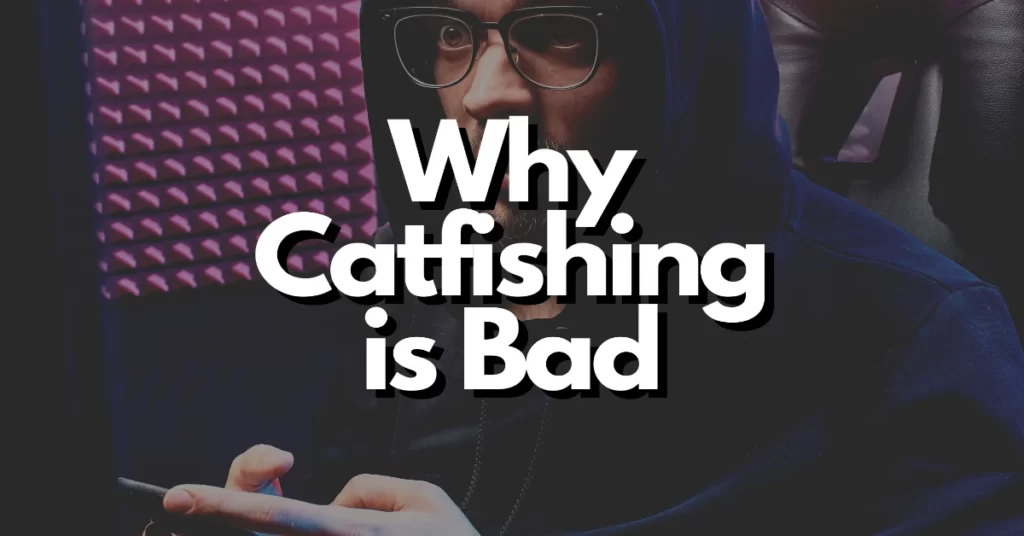Catfishing, the act of creating a fake online identity to deceive others, has become increasingly prevalent in our digitally connected world. However, it is essential to understand why catfishing is not just a harmless prank but a deeply harmful and unethical practice.
In this blog post, we will explore the reasons why catfishing is bad and the negative impacts it has on individuals and society. From emotional manipulation and psychological trauma to identity theft and shattered trust, catfishing leaves a trail of destruction in its wake.

By shedding light on the dark side of catfishing, we hope to raise awareness about its harmful consequences and encourage responsible online behavior.
Emotional Manipulation and Psychological Impact of Catfishing
Catfishing involves a calculated form of emotional manipulation that can have severe psychological repercussions on its victims. By creating a false persona, catfishers gain the trust and emotional investment of unsuspecting individuals, only to shatter their world when the deception is revealed.
Victims often experience a range of negative emotions such as betrayal, humiliation, and a profound sense of loss. The psychological impact of catfishing can lead to decreased self-esteem, anxiety, depression, and even post-traumatic stress disorder (PTSD).
It is crucial to recognize the devastating toll that catfishing takes on victims’ mental well-being and work towards creating a safer online environment where trust and authenticity prevail.
Shattered Trust: The Consequences of Deceptive Online Relationships
Deceptive online relationships resulting from catfishing can cause irreparable damage to trust, both in the online world and offline. When victims discover they have been deceived by a catfish, the impact is profound, leaving them questioning their judgment and doubting future relationships.
Shattered trust extends beyond the immediate relationship, as victims may find it challenging to trust others, both online and in real life. This loss of trust can affect various aspects of a person’s life, including personal relationships, professional interactions, and overall well-being.
Rebuilding trust after experiencing deceptive online relationships is a challenging journey that requires support, understanding, and time to heal the emotional wounds inflicted by the catfish.
Unveiling the Mask: Identity Theft and the Dangers of Catfishing
One of the most significant dangers associated with catfishing is the threat of identity theft. Catfishers often steal images, personal information, and even financial details to perpetuate their false personas.
The unsuspecting victims are left vulnerable to potential misuse of their private information, leading to financial loss, reputational damage, and long-term consequences. The dangers of catfishing go beyond emotional manipulation and extend into the realm of real-world harm.
Victims can find themselves entangled in a web of deceit, struggling to regain control of their stolen identity and restore their sense of security. It is crucial to raise awareness about the risks of identity theft associated with catfishing and take proactive measures to protect personal information.
Society at Risk: The Damaging Effects of Catfishing on Online Communities
Catfishing poses significant risks to the fabric of online communities, eroding trust and undermining genuine connections. When individuals engage in deceptive behaviors, it sows seeds of doubt and suspicion among community members, leading to a breakdown in communication and collaboration.
The proliferation of catfishing can create a toxic environment where people hesitate to share personal stories, express genuine opinions, or engage in meaningful dialogue. This erosion of trust and authenticity threatens the vibrancy and inclusivity of online communities, ultimately impacting society at large.
It is crucial to address catfishing as a collective problem, promoting awareness, education, and supportive measures to foster a safer and more trustworthy online community for everyone.

Conclusion
In conclusion, catfishing is a deceptive practice that can have severe consequences for its victims and society as a whole. It goes beyond a simple breach of trust; it can cause emotional and psychological harm, destroy relationships, and lead to identity theft.
Catfishing undermines the very foundation of honest and authentic connections that we strive for in the online world. It is crucial for individuals to be aware of the dangers of catfishing and to approach online interactions with caution.
By fostering a culture of trust, empathy, and responsible online behavior, we can work towards creating a safer and more authentic digital environment where catfishing is no longer tolerated.

